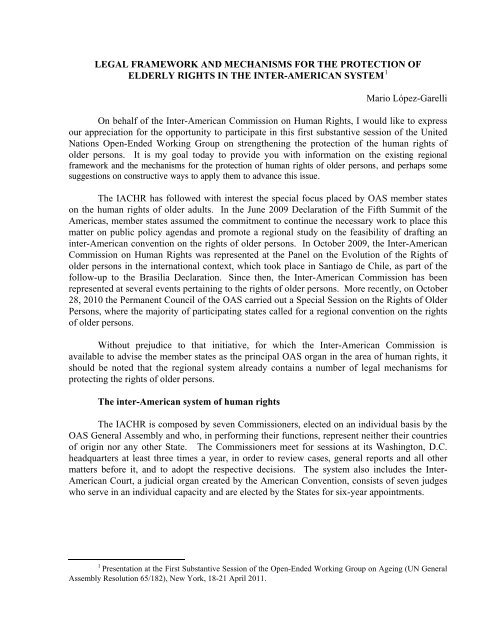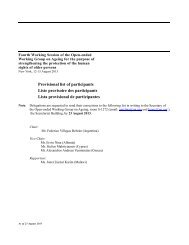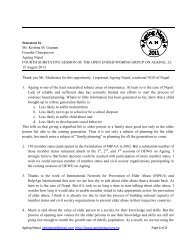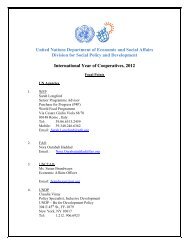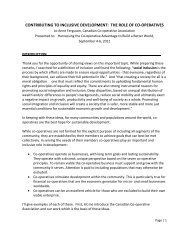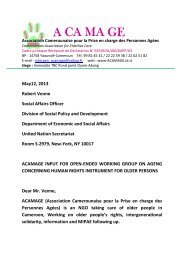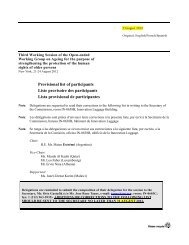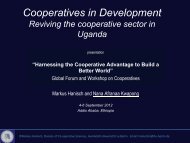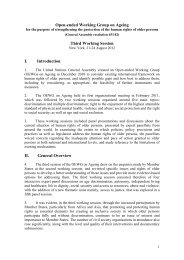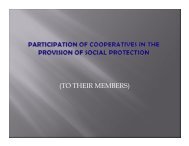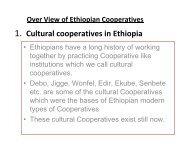Mr. Mario Lopez, Inter-American Commission on Human Rights
Mr. Mario Lopez, Inter-American Commission on Human Rights
Mr. Mario Lopez, Inter-American Commission on Human Rights
Create successful ePaper yourself
Turn your PDF publications into a flip-book with our unique Google optimized e-Paper software.
LEGAL FRAMEWORK AND MECHANISMS FOR THE PROTECTION OF<br />
ELDERLY RIGHTS IN THE INTER-AMERICAN SYSTEM 1<br />
<str<strong>on</strong>g>Mario</str<strong>on</strong>g> López-Garelli<br />
On behalf of the <str<strong>on</strong>g>Inter</str<strong>on</strong>g>-<str<strong>on</strong>g>American</str<strong>on</strong>g> <str<strong>on</strong>g>Commissi<strong>on</strong></str<strong>on</strong>g> <strong>on</strong> <strong>Human</strong> <strong>Rights</strong>, I would like to express<br />
our appreciati<strong>on</strong> for the opportunity to participate in this first substantive sessi<strong>on</strong> of the United<br />
Nati<strong>on</strong>s Open-Ended Working Group <strong>on</strong> strengthening the protecti<strong>on</strong> of the human rights of<br />
older pers<strong>on</strong>s. It is my goal today to provide you with informati<strong>on</strong> <strong>on</strong> the existing regi<strong>on</strong>al<br />
framework and the mechanisms for the protecti<strong>on</strong> of human rights of older pers<strong>on</strong>s, and perhaps some<br />
suggesti<strong>on</strong>s <strong>on</strong> c<strong>on</strong>structive ways to apply them to advance this issue.<br />
The IACHR has followed with interest the special focus placed by OAS member states<br />
<strong>on</strong> the human rights of older adults. In the June 2009 Declarati<strong>on</strong> of the Fifth Summit of the<br />
Americas, member states assumed the commitment to c<strong>on</strong>tinue the necessary work to place this<br />
matter <strong>on</strong> public policy agendas and promote a regi<strong>on</strong>al study <strong>on</strong> the feasibility of drafting an<br />
inter-<str<strong>on</strong>g>American</str<strong>on</strong>g> c<strong>on</strong>venti<strong>on</strong> <strong>on</strong> the rights of older pers<strong>on</strong>s. In October 2009, the <str<strong>on</strong>g>Inter</str<strong>on</strong>g>-<str<strong>on</strong>g>American</str<strong>on</strong>g><br />
<str<strong>on</strong>g>Commissi<strong>on</strong></str<strong>on</strong>g> <strong>on</strong> <strong>Human</strong> <strong>Rights</strong> was represented at the Panel <strong>on</strong> the Evoluti<strong>on</strong> of the <strong>Rights</strong> of<br />
older pers<strong>on</strong>s in the internati<strong>on</strong>al c<strong>on</strong>text, which took place in Santiago de Chile, as part of the<br />
follow-up to the Brasilia Declarati<strong>on</strong>. Since then, the <str<strong>on</strong>g>Inter</str<strong>on</strong>g>-<str<strong>on</strong>g>American</str<strong>on</strong>g> <str<strong>on</strong>g>Commissi<strong>on</strong></str<strong>on</strong>g> has been<br />
represented at several events pertaining to the rights of older pers<strong>on</strong>s. More recently, <strong>on</strong> October<br />
28, 2010 the Permanent Council of the OAS carried out a Special Sessi<strong>on</strong> <strong>on</strong> the <strong>Rights</strong> of Older<br />
Pers<strong>on</strong>s, where the majority of participating states called for a regi<strong>on</strong>al c<strong>on</strong>venti<strong>on</strong> <strong>on</strong> the rights<br />
of older pers<strong>on</strong>s.<br />
Without prejudice to that initiative, for which the <str<strong>on</strong>g>Inter</str<strong>on</strong>g>-<str<strong>on</strong>g>American</str<strong>on</strong>g> <str<strong>on</strong>g>Commissi<strong>on</strong></str<strong>on</strong>g> is<br />
available to advise the member states as the principal OAS organ in the area of human rights, it<br />
should be noted that the regi<strong>on</strong>al system already c<strong>on</strong>tains a number of legal mechanisms for<br />
protecting the rights of older pers<strong>on</strong>s.<br />
The inter-<str<strong>on</strong>g>American</str<strong>on</strong>g> system of human rights<br />
The IACHR is composed by seven <str<strong>on</strong>g>Commissi<strong>on</strong></str<strong>on</strong>g>ers, elected <strong>on</strong> an individual basis by the<br />
OAS General Assembly and who, in performing their functi<strong>on</strong>s, represent neither their countries<br />
of origin nor any other State. The <str<strong>on</strong>g>Commissi<strong>on</strong></str<strong>on</strong>g>ers meet for sessi<strong>on</strong>s at its Washingt<strong>on</strong>, D.C.<br />
headquarters at least three times a year, in order to review cases, general reports and all other<br />
matters before it, and to adopt the respective decisi<strong>on</strong>s. The system also includes the <str<strong>on</strong>g>Inter</str<strong>on</strong>g>-<br />
<str<strong>on</strong>g>American</str<strong>on</strong>g> Court, a judicial organ created by the <str<strong>on</strong>g>American</str<strong>on</strong>g> C<strong>on</strong>venti<strong>on</strong>, c<strong>on</strong>sists of seven judges<br />
who serve in an individual capacity and are elected by the States for six-year appointments.<br />
1<br />
Presentati<strong>on</strong> at the First Substantive Sessi<strong>on</strong> of the Open-Ended Working Group <strong>on</strong> Ageing (UN General<br />
Assembly Resoluti<strong>on</strong> 65/182), New York, 18-21 April 2011.
2<br />
The <str<strong>on</strong>g>Inter</str<strong>on</strong>g>-<str<strong>on</strong>g>American</str<strong>on</strong>g> <str<strong>on</strong>g>Commissi<strong>on</strong></str<strong>on</strong>g>’s main functi<strong>on</strong> is to promote the observance and<br />
defense of human rights. In fulfilling its mandate, the IACHR performs the following activities:<br />
a. Receives, analyzes, and investigates individual petiti<strong>on</strong>s alleging human<br />
rights violati<strong>on</strong>s.<br />
b. Observes the general level of human rights in the member States and,<br />
when it deems appropriate, publishes special reports <strong>on</strong> the situati<strong>on</strong> in<br />
given States or regarding certain rights or groups of pers<strong>on</strong>s.<br />
c. C<strong>on</strong>ducts <strong>on</strong>-site visits to countries to observe the general situati<strong>on</strong> in<br />
greater depth and issues reports with finding and recommendati<strong>on</strong>s to the<br />
respective member states.<br />
d. Encourages awareness of human rights in the OAS Member States.<br />
e. Organizes and participates in c<strong>on</strong>ferences and meetings with governments,<br />
academics, and n<strong>on</strong>governmental organizati<strong>on</strong>s.<br />
f. Presents recommendati<strong>on</strong>s to OAS member States <strong>on</strong> the adopti<strong>on</strong> of<br />
measures to assist in promoting and guaranteeing human rights.<br />
g. Grants precauti<strong>on</strong>ary measures to prevent serious and irreparable harm to<br />
human rights in urgent cases; it can also request provisi<strong>on</strong>al measures to<br />
the <str<strong>on</strong>g>Inter</str<strong>on</strong>g>-<str<strong>on</strong>g>American</str<strong>on</strong>g> Court.<br />
h. Submits cases to the c<strong>on</strong>tentious jurisdicti<strong>on</strong> of the <str<strong>on</strong>g>Inter</str<strong>on</strong>g>-<str<strong>on</strong>g>American</str<strong>on</strong>g> Court,<br />
and it appears before the Court in those cases.<br />
i. Asks the <str<strong>on</strong>g>Inter</str<strong>on</strong>g>-<str<strong>on</strong>g>American</str<strong>on</strong>g> Court for advisory opini<strong>on</strong>s <strong>on</strong> issues arising<br />
from the interpretati<strong>on</strong> of the <str<strong>on</strong>g>American</str<strong>on</strong>g> C<strong>on</strong>venti<strong>on</strong>.<br />
Individual petiti<strong>on</strong> system<br />
Any pers<strong>on</strong>, group of individuals, or n<strong>on</strong>governmental organizati<strong>on</strong> can place a<br />
complaint before the <str<strong>on</strong>g>Commissi<strong>on</strong></str<strong>on</strong>g>, alleging violati<strong>on</strong>s of the human rights protected by the<br />
<str<strong>on</strong>g>American</str<strong>on</strong>g> C<strong>on</strong>venti<strong>on</strong> and the <str<strong>on</strong>g>American</str<strong>on</strong>g> Declarati<strong>on</strong> of the <strong>Rights</strong> and Duties of Man. Petiti<strong>on</strong>s<br />
may be presented in any of the four official languages of the OAS, by victims themselves or by<br />
third parties. The IACHR studies those petiti<strong>on</strong>s that allege that State agents have committed a<br />
human rights violati<strong>on</strong>. If it finds that the respective State is resp<strong>on</strong>sible, it recommends a<br />
complete investigati<strong>on</strong> and the punishment of all the individuals resp<strong>on</strong>sible, together with full<br />
reparati<strong>on</strong>s to the victims or their families.
3<br />
Until now, very few cases regarding the rights of older pers<strong>on</strong>s that have been brought to<br />
the system and decided by its organs; most of them involve the issues of social security and<br />
retirement. The first of them is known as the Case of the Five Pensi<strong>on</strong>ers v. Peru, in which the<br />
<str<strong>on</strong>g>Inter</str<strong>on</strong>g>-<str<strong>on</strong>g>American</str<strong>on</strong>g> Court found that the State was resp<strong>on</strong>sible for the violati<strong>on</strong> of the victims’ right<br />
to judicial protecti<strong>on</strong> and property, inasmuch as it did not comply with the decisi<strong>on</strong> of the<br />
Supreme Court of that country to restore their pensi<strong>on</strong>s. 2 In another case regarding Peru, the<br />
victims had opted for a pensi<strong>on</strong> plan, but did not receive it for ten years after their retirement,<br />
and were also not protected by the domestic tribunals. The <str<strong>on</strong>g>Inter</str<strong>on</strong>g>-<str<strong>on</strong>g>American</str<strong>on</strong>g> Court determined<br />
that the State had violated their rights to judicial protecti<strong>on</strong> and to property; however, it did not<br />
c<strong>on</strong>sider that there was a violati<strong>on</strong> of Article 26 of the <str<strong>on</strong>g>American</str<strong>on</strong>g> C<strong>on</strong>venti<strong>on</strong>, which pertains to<br />
the progressive development of ec<strong>on</strong>omic, social and cultural rights. 3<br />
Another interesting precedent was set in the Yakye Axa Case, dealing primarily with<br />
indigenous peoples’ rights in Paraguay, which the <str<strong>on</strong>g>Inter</str<strong>on</strong>g>-<str<strong>on</strong>g>American</str<strong>on</strong>g> <str<strong>on</strong>g>Commissi<strong>on</strong></str<strong>on</strong>g> submitted to the<br />
Court after that State failed to comply with its recommendati<strong>on</strong>s. In the judgment of the Court, it<br />
was established that Paraguay had the duty to ensure the aut<strong>on</strong>omy and c<strong>on</strong>tinuing functi<strong>on</strong>ality<br />
of older pers<strong>on</strong>s, by ensuring the enjoyment of their right to adequate food, access to clean water<br />
and health care. 4 The Court determined the duty of the State to provide care for the elderly with<br />
chr<strong>on</strong>ic diseases and those who were in terminal stages, in order to help them avoid unnecessary<br />
suffering.<br />
The IACHR and the Court have determined in various cases the duty of the State to<br />
respect and guarantee the enjoyment of human rights of all pers<strong>on</strong>s subject to its jurisdicti<strong>on</strong>,<br />
with respect to the acti<strong>on</strong>s of authorities but also of third parties. Both organs have also adopted<br />
urgent measures for the protecti<strong>on</strong> of pers<strong>on</strong>s deprived of liberty, specifically regarding their life<br />
and pers<strong>on</strong>al integrity, as well as the minimum c<strong>on</strong>diti<strong>on</strong>s compatible with human dignity,<br />
sanitati<strong>on</strong> and nutriti<strong>on</strong>. In the first case decided with respect to Brazil, the <str<strong>on</strong>g>Inter</str<strong>on</strong>g>-<str<strong>on</strong>g>American</str<strong>on</strong>g><br />
Court held that the State was resp<strong>on</strong>sible for the violati<strong>on</strong> of the rights of Damião Ximenes<br />
Lopes, a patient who was beaten, tortured and eventually died in a psychiatric hospital in that<br />
country in 1999. The Court found that Brazil was resp<strong>on</strong>sible for violating the rights to physical<br />
integrity and to life of the victim, and the rights to access to justice and due process of his<br />
family. Given that the case involved a patient in a l<strong>on</strong>g-term care facility, the standards set by<br />
the Court could be relevant in an eventual case involving the rights of older pers<strong>on</strong>s in a similar<br />
situati<strong>on</strong> of restricted liberty. 5<br />
2 <str<strong>on</strong>g>Inter</str<strong>on</strong>g>-<str<strong>on</strong>g>American</str<strong>on</strong>g> Court of <strong>Human</strong> <strong>Rights</strong>, Case of the Five Pensi<strong>on</strong>ers v. Peru, Judgment of February<br />
28, 2003 (Merits, Reparati<strong>on</strong>s and Costs).<br />
3 I-ACtHR, Case of Acevedo Buendia et al v. Peru, Judgment of July 1, 2009 (Merits, Reparati<strong>on</strong>s and<br />
Costs).<br />
4 I-ACtHR, Case of the Yakye Axa Indigenous Community v. Paraguay, Judgment of June 17,<br />
2005(Merits, Reparati<strong>on</strong>s and Costs).<br />
5 I-ACtHR, Case of Ximenes Lopes v. Brazil, Judgment of 17 August, 2006(Merits, Reparati<strong>on</strong>s and<br />
Costs).
4<br />
Also worthy of menti<strong>on</strong> is the case of Case of Karina M<strong>on</strong>tenegro against Ecuador,<br />
where the allegati<strong>on</strong>s regard the arrest and impris<strong>on</strong>ment of women over 65 years of age, in<br />
violati<strong>on</strong> of that country’s nati<strong>on</strong>al legislati<strong>on</strong>. 6 In its admissibility decisi<strong>on</strong>, the <str<strong>on</strong>g>Inter</str<strong>on</strong>g>-<str<strong>on</strong>g>American</str<strong>on</strong>g><br />
<str<strong>on</strong>g>Commissi<strong>on</strong></str<strong>on</strong>g> c<strong>on</strong>sidered that a colorable claim was raised by the arguments of the failure by the<br />
authorities to substitute preventive detenti<strong>on</strong> for house arrest, as ordered by the judge in the case<br />
of Ms. M<strong>on</strong>tenegro and the other 4 alleged victims.<br />
Rapporteurships and thematic work<br />
In additi<strong>on</strong> to its functi<strong>on</strong> of applying the standards set in the <str<strong>on</strong>g>American</str<strong>on</strong>g> C<strong>on</strong>venti<strong>on</strong> and<br />
the <str<strong>on</strong>g>American</str<strong>on</strong>g> Declarati<strong>on</strong>, as well as the other relevant regi<strong>on</strong>al instruments, the <str<strong>on</strong>g>Commissi<strong>on</strong></str<strong>on</strong>g><br />
also works from a thematic perspective. This implies the treatment of certain special issues or<br />
the human rights situati<strong>on</strong>s of specific groups of pers<strong>on</strong>s through its rapporteurships assigned to<br />
the members of the <str<strong>on</strong>g>Commissi<strong>on</strong></str<strong>on</strong>g> or an external specialist. Unlike other internati<strong>on</strong>al bodies, the<br />
thematic rapporteurships of the IACHR are created by the <str<strong>on</strong>g>Commissi<strong>on</strong></str<strong>on</strong>g>ers themselves, who<br />
define the mandate and may name the rapporteur from am<strong>on</strong>g the members of this body, or<br />
decide to assign the functi<strong>on</strong>s to a special expert reporting directly to them. Rapporteurs c<strong>on</strong>duct<br />
a number of activities, including <strong>on</strong>-site visits and the preparati<strong>on</strong> of reports for c<strong>on</strong>siderati<strong>on</strong> by<br />
the plenary of <str<strong>on</strong>g>Commissi<strong>on</strong></str<strong>on</strong>g>.<br />
There are currently seven rapporteurships, each assigned to a <str<strong>on</strong>g>Commissi<strong>on</strong></str<strong>on</strong>g>er, with respect<br />
to the following issues: women’s rights, children’s rights, c<strong>on</strong>diti<strong>on</strong>s at detenti<strong>on</strong> centers in the<br />
Americas, internally displaced pers<strong>on</strong>s, and the rights of migrant workers and their families.<br />
Finally, there is a Special Rapporteur <strong>on</strong> Freedom of Expressi<strong>on</strong>, led by an expert working full<br />
time at the IACHR Executive Secretariat. Over the past 10 years, the work of the various<br />
rapporteurs has increased substantially, resulting in the broad disseminati<strong>on</strong> of informati<strong>on</strong> <strong>on</strong><br />
human rights in the Americas and also in obtaining justice in individual cases and in emergency<br />
protective measures.<br />
Hearings<br />
Another important way for the <str<strong>on</strong>g>Inter</str<strong>on</strong>g>-<str<strong>on</strong>g>American</str<strong>on</strong>g> <str<strong>on</strong>g>Commissi<strong>on</strong></str<strong>on</strong>g> to focus <strong>on</strong> specific human<br />
rights situati<strong>on</strong>s is to hold thematic or general hearings during its periods of sessi<strong>on</strong>s. These<br />
hearings are open to the public, are broadcast live <strong>on</strong>line, and receive ample media coverage, all<br />
of which are excellent promoti<strong>on</strong>al tools. In some cases, the informati<strong>on</strong> received from Member<br />
States and representatives of civil society at these hearings has caused the IACHR to observe a<br />
topic more closely or even to address it in a special report. One recent example is a series of<br />
hearings <strong>on</strong> the rights of migrant workers in the United States, which led to visits by the thematic<br />
rapporteur, and ultimately resulted in a study of due process and detenti<strong>on</strong> of migrants in that<br />
country, with c<strong>on</strong>crete c<strong>on</strong>clusi<strong>on</strong>s and recommendati<strong>on</strong>s. 7 A very interesting development in<br />
6 IACHR, Report Nº 48/07, Petiti<strong>on</strong>s 261-03, 397-03 and 1377-04, Admissibility, Karina M<strong>on</strong>tenegro et<br />
al., Ecuador, July 23, 2007.<br />
7 IACHR, Report <strong>on</strong> Immigrati<strong>on</strong> in the United States: Detenti<strong>on</strong> and Due Process, OEA/Ser.L/V/II. Doc.<br />
78/10, 30 December 2010.
5<br />
this regard has been the use of the legal analysis, c<strong>on</strong>clusi<strong>on</strong>s and recommendati<strong>on</strong>s of this report<br />
in a specific domestic case regarding deportati<strong>on</strong>s in the United States. The IACHR has actively<br />
promoted the use of its decisi<strong>on</strong>s and standards in proceedings at the domestic level as a very<br />
c<strong>on</strong>crete way of expanding human rights protecti<strong>on</strong> in the Member States of the OAS.<br />
Legal provisi<strong>on</strong>s<br />
As for the rights expressly recognized in the inter-<str<strong>on</strong>g>American</str<strong>on</strong>g> instruments, Article 17 of<br />
the Additi<strong>on</strong>al Protocol to the <str<strong>on</strong>g>American</str<strong>on</strong>g> C<strong>on</strong>venti<strong>on</strong> <strong>on</strong> <strong>Human</strong> <strong>Rights</strong> in the area of Ec<strong>on</strong>omic,<br />
Social and Cultural <strong>Rights</strong> (Protocol of San Salvador) guarantees every pers<strong>on</strong> the right to<br />
special protecti<strong>on</strong> during old age. The duty imposed by this provisi<strong>on</strong> should be interpreted in<br />
the light of Article 26 of the <str<strong>on</strong>g>American</str<strong>on</strong>g> C<strong>on</strong>venti<strong>on</strong>, which refers to the progressive development<br />
of ec<strong>on</strong>omic, social, and cultural rights, to the extent that resources are available. Stemming<br />
from this is the correlative duty not to backtrack from achievements attained in this area. The<br />
n<strong>on</strong>-regressi<strong>on</strong> obligati<strong>on</strong> developed by other internati<strong>on</strong>al organizati<strong>on</strong>s has been understood by<br />
the IACHR as a state obligati<strong>on</strong> that is justiciable through the individual petiti<strong>on</strong> mechanism set<br />
forth in the <str<strong>on</strong>g>American</str<strong>on</strong>g> C<strong>on</strong>venti<strong>on</strong>.<br />
Additi<strong>on</strong>ally, the Protocol of San Salvador guarantees at Article 9 the right to social<br />
security, which has been examined in various cases before the <str<strong>on</strong>g>Commissi<strong>on</strong></str<strong>on</strong>g> and the <str<strong>on</strong>g>Inter</str<strong>on</strong>g>-<br />
<str<strong>on</strong>g>American</str<strong>on</strong>g> Court of <strong>Human</strong> <strong>Rights</strong>. Although this right is not justiciable under that instrument,<br />
the bodies of the inter-<str<strong>on</strong>g>American</str<strong>on</strong>g> system can analyze the duty of progressive development in<br />
some specific cases in which it is argued that the applicati<strong>on</strong> of social security rules has resulted<br />
in violati<strong>on</strong>s of the rights to property and judicial protecti<strong>on</strong>, am<strong>on</strong>g others.<br />
Other relevant provisi<strong>on</strong>s of the Protocol of San Salvador are Article 10, which<br />
guarantees the right to health, understood as the enjoyment of the highest level of physical,<br />
mental, and social well-being. Article 18 also recognizes the rights of pers<strong>on</strong>s with physical or<br />
mental disabilities, and Article 3 prohibits discriminati<strong>on</strong>.<br />
More generally, all provisi<strong>on</strong>s of the instruments of the inter-<str<strong>on</strong>g>American</str<strong>on</strong>g> system are<br />
available to older adults who believe their rights have been violated by any of the OAS member<br />
states–in particular, the provisi<strong>on</strong>s guaranteeing equal treatment before the law for cases in<br />
which older adults believe they have been given discriminatory treatment without proper<br />
justificati<strong>on</strong>, in keeping with inter-<str<strong>on</strong>g>American</str<strong>on</strong>g> jurisprudence.<br />
C<strong>on</strong>clusi<strong>on</strong><br />
These legal mechanisms offer an appropriate frame of reference for channeling the<br />
interest of the OAS member states and their inhabitants in the topic of older pers<strong>on</strong>s, which has<br />
already spurred various important declarati<strong>on</strong>s and resoluti<strong>on</strong>s of its political bodies. The<br />
immediate challenge lies in making creative use of the possibilities offered by the inter-<br />
<str<strong>on</strong>g>American</str<strong>on</strong>g> human rights system, with the shared objective of developing and broadening legal<br />
means of protecting older pers<strong>on</strong>s.
6<br />
The <str<strong>on</strong>g>Inter</str<strong>on</strong>g>-<str<strong>on</strong>g>American</str<strong>on</strong>g> <str<strong>on</strong>g>Commissi<strong>on</strong></str<strong>on</strong>g> believes it can make a significant c<strong>on</strong>tributi<strong>on</strong> to this<br />
process in the c<strong>on</strong>text of its mandate to defend and promote the human rights of all pers<strong>on</strong>s,<br />
without discriminati<strong>on</strong> of any kind. This sessi<strong>on</strong> has focused <strong>on</strong> understanding the current<br />
situati<strong>on</strong> of the human rights of older pers<strong>on</strong>s all over the world, specifically in the case of this<br />
panel, the human rights frameworks available. We hope to provide the informati<strong>on</strong> and advice<br />
you c<strong>on</strong>sider necessary with a view to advancing toward this goal.<br />
Thank you very much.


